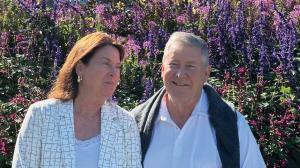An Enduring Gift: The Branch Endowment for Duke Heart and Duke Cancer Institute
It's all about leaving a legacy. That’s what Brad Branch said about establishing the Catherine S. and J. Bradford Branch Fund with his wife, Catherine Shingleton Branch. Through a generous estate gift to Duke, the couple has created an endowment to benefit both Duke Heart and Duke Cancer Institute (DCI).
“After success in career and life, leaving a legacy of good becomes important,” said Brad. “While simply leaving a portion of my estate on its own to a good cause would help, leaving money to Duke Health amplifies the benefit of any gift. My commitment, combined with that of many others, put to work at an organization with so many smart people making miracles happen every day, has an exponential effect. In mathematical terms, it's a gift raised to the power of Duke.”
By supporting DCI, Cathy honors the legacy of her late father, William W. Shingleton, MD. A pioneer in the field of oncology, Shingleton was influential in the development of the 1971 National Cancer Act, legislation that appropriated federal funds to build comprehensive cancer centers nationwide. He was also the first director of Duke Comprehensive Cancer Center (now called the Duke Cancer Institute).
Cathy described her dad as a gentle giant. “He was a wonderful, caring, loving doctor, a very skilled surgeon, an incredible administrator, and a beautiful father,” she said. “He was dedicated to finding the cure for cancer.” Her gift is a way for her to honor her father and help find that cure.
Seeing the progress DCI has made throughout the years, Cathy understands that the funding Duke physicians and researchers receive from donors is critical to expanding the center’s innovative research. As a member of the DCI Board of Advisors, which she joined after her dad’s passing, Cathy has seen firsthand the impact of the center. Similarly, Brad understands the value of Duke Heart through his service on the Heart Leadership Council.
Brad and Cathy agree that the two areas their bequest supports are the logical choices for their desire to see improvements in mortality rates. They sing the praises of Duke Heart Center Director Manesh Patel, MD, Richard Sean Stack, M.D. Distinguished Professor of Cardiology and chief of the divisions of cardiology and clinical pharmacology, and DCI Executive Director Michael Kastan, MD, PhD, William and Jane Shingleton Professor of Pharmacology and Cancer Biology. Brad and Cathy called them “absolutely incredible talents.
That high regard is reciprocated. “I am grateful for all of Brad’s contributions to Duke Heart,” said Patel, who heads the Duke Heart Precision and Innovation Collaboratory. “He is part of a highly engaged group of people within the Heart Leadership Council who have informed the development of our Innovation Collaboratory’s efforts to accelerate improvements in cardiovascular care. Brad’s tremendous engagement in these efforts sets the example and invites others to expand their philanthropic engagement as well.”
Kastan, who is honored to follow in the footsteps of Cathy’s father, appreciates Cathy’s commitment to ending cancer. “Dr. Shingleton was an extraordinary man,” he said. “I’m so grateful that Cathy continues his legacy through her own extraordinary service on our board and with her generous philanthropy. DCI is lucky to have her talent, care, and ongoing support.”
Cathy and Brad created an unrestricted gift for these areas rather than specifying how the funds should be used. “There's nobody better to figure out where they need to spend money than Mike Kastan and Manesh Patel and whoever their successors are,” said Brad. “They know what is important and how best to use the money to fund innovation.”
Whether funds from their endowment are ultimately used for Duke Heart Center patient care, teaching, or research — or a combination of the three — Cathy and Brad know that their gift will support one of the top cardiology programs in the country, staffed with leading cardiovascular specialists who treat more than 65,000 people with heart disease every year.
As a certified public accountant for many years, Brad appreciates that estate gifts may offer tax advantages to the donor. “Leaving a gift in this way is beneficial not just to your family but to the organization you’re donating to,” he said. “I wish there were more awareness of this because this is a fabulous way to give.” He encourages donors to reach out to development staff members at Duke who can help structure tax-advantaged gifts.
“Since there are so many smart people at Duke doing innovative research, donating to Duke exponentially magnifies the value of a gift,” said Brad. “Cathy and I know that the money from our endowment will be put to good use in research and improving patient care and outcomes, both at Duke Heart and DCI.”



